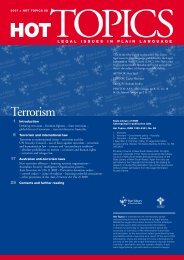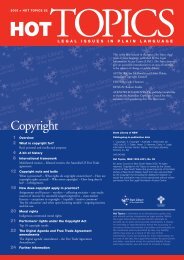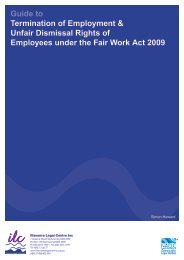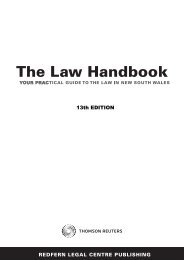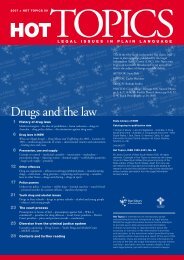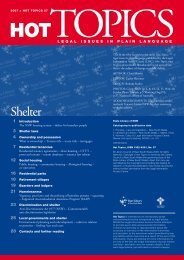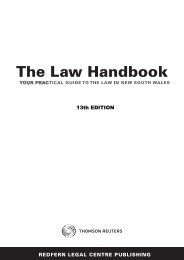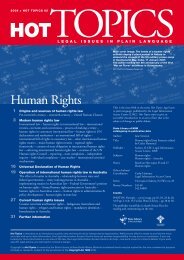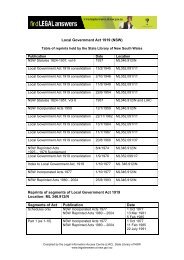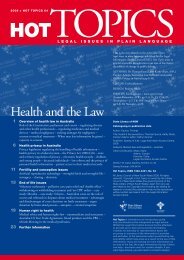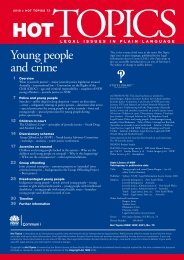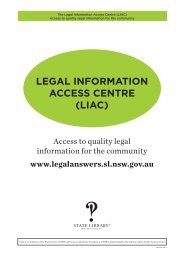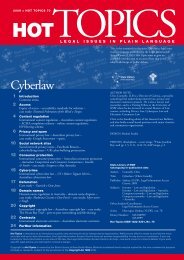Aboriginal people and the law - Legal Information Access Centre
Aboriginal people and the law - Legal Information Access Centre
Aboriginal people and the law - Legal Information Access Centre
You also want an ePaper? Increase the reach of your titles
YUMPU automatically turns print PDFs into web optimized ePapers that Google loves.
60 The Law H<strong>and</strong>bookno contemporary evidence to suggest that all, or most,of <strong>the</strong> cultural practices of <strong>the</strong> Larrakia <strong>people</strong> whichwere observed during <strong>the</strong> latter part of <strong>the</strong> nineteenthcentury continued to be practised. During <strong>the</strong> periodfrom WWII to 1970 <strong>the</strong> Larrakia <strong>people</strong> were removedfrom <strong>the</strong> claim area, Darwin, to Berrimah <strong>and</strong> required tohold a permit to enter <strong>the</strong>ir traditional l<strong>and</strong>s. The FullCourt dismissed <strong>the</strong> appeal, holding that <strong>the</strong> applicantgroup had failed to show continuity in observance oftraditional <strong>law</strong>, <strong>and</strong> that <strong>the</strong> <strong>law</strong>s <strong>and</strong> customs had beentransmitted in a traditional way. Although Yorta Yortaaccepts that <strong>law</strong> <strong>and</strong> custom may adapt to <strong>the</strong> pressuresof colonisation <strong>and</strong> yet still be traditional, <strong>the</strong> claimgroup must demonstrate that observance of <strong>law</strong> <strong>and</strong>custom continues to be observed <strong>and</strong> acknowledged inways that remain true to <strong>the</strong> pre-colonial system of <strong>law</strong>.Compulsory acquisition of Native TitleIn 2008 <strong>the</strong> High Court held that <strong>the</strong> Nor<strong>the</strong>rn Territorygovernment's compulsory acquisition (extinguishmentunder s 24MD(2) of <strong>the</strong> Native Title Act of native titlel<strong>and</strong> <strong>and</strong> rights “for any purpose whatsoever” was avalid exercise of executive power for <strong>the</strong> purpose ofleasing <strong>and</strong> disposing of that interest into private h<strong>and</strong>sunder s 43 of <strong>the</strong> Crown L<strong>and</strong>s Act 1992 (NT). Kirby J (indissent) refused to take “a purely literal approach” tocompulsory acquisition “for any purpose whatsoever”<strong>and</strong> recounted previous High Court decisions recognising<strong>the</strong> “spiritual, cultural <strong>and</strong> social connection” inherentin native title. His Honour said that <strong>the</strong> decision inWard did not cast doubt on that principle or its significanceas a distinguishing feature of native title <strong>and</strong> alsothat <strong>the</strong> acquisition was required to be on just terms.Formerly, <strong>the</strong> Territory could only compulsorily acquirel<strong>and</strong> for public purposes; however, <strong>the</strong> term “public” hadbeen removed. Kiefel J, who also disagreed with <strong>the</strong>majority, was unable to dismiss <strong>the</strong> relevance of o<strong>the</strong>rpublic purpose cases without express words in <strong>the</strong>statute confirming <strong>the</strong> abrogation of <strong>the</strong> previous <strong>law</strong>.On this point Kirby J said “legislation depriving individualsof established legal rights must be clear <strong>and</strong>unambiguous”. The majority, however, had found that<strong>the</strong> provision was not ambiguous (Griffiths v Minister forL<strong>and</strong>s, Planning <strong>and</strong> Environment (2008) 235 CLR 232).The later case of Wurridjal v Commonwealth of Australia(2009) 237 CLR 309 did confirm that Territory <strong>law</strong>s for<strong>the</strong> acquisition of property were required to makeprovision for just terms compensation.Bodney v BennellIn Bodney v Bennell [2008] FCAFC 63; (2008) 167 FCR 84<strong>the</strong> Full Court held that <strong>the</strong> FCA applied <strong>the</strong> wrong test indetermining whe<strong>the</strong>r <strong>the</strong> claimants had continued toacknowledge <strong>and</strong> observe traditional <strong>law</strong>s <strong>and</strong> customsfrom sovereignty to <strong>the</strong> present <strong>and</strong> also that continuityof connection to country could be established byevidence of continuity of a society. The trial judge hadfailed to consider whe<strong>the</strong>r <strong>the</strong> claimants could establishcontinuing connection to <strong>the</strong> area under claim. It wasnot enough for <strong>the</strong> trial judge to rely on <strong>the</strong> claimant'sestablished connection with <strong>the</strong> claim area of <strong>the</strong> singleNoongar claim as a whole (which was much larger than<strong>the</strong> claim in respect of Perth) to establish that aconnection with <strong>the</strong> Perth area observed by <strong>the</strong>ir ancestorsat <strong>the</strong> time of sovereignty had continued substantiallyuninterrupted since sovereignty.Purpose of <strong>the</strong> legislationThe purpose of <strong>the</strong> Native Title Act 1993,which was extensively amended in 1998, isto:• validate acts that were invalidated by <strong>the</strong>decision in Mabo (No 2)• establish a process to determine <strong>the</strong> nature<strong>and</strong> extent of native title• regulate how native title can be dealtwith in <strong>the</strong> future• recognise <strong>and</strong> protect native title.Extinguishment of native titleThe Act confirms that previous exclusivepossession acts extinguish native title, <strong>and</strong>previous non-exclusive possession acts extinguishnative title to <strong>the</strong> extent of anyinconsistency.Previous exclusive possession acts includecertain interests created before 23 December1996 (<strong>the</strong> date of <strong>the</strong> Wik decision), such as:• freehold estates• commercial leases• exclusive agricultural or pastoral leases• residential leases• community purpose leases• interests appearing in Sch 1 of <strong>the</strong> Act• any lease conferring a right of exclusivepossession.Acts that do not extinguish native titleInterests granted or created for <strong>the</strong> benefit of<strong>Aboriginal</strong> <strong>people</strong>, <strong>and</strong> those involving <strong>the</strong>creation of national parks or involving aCrown-to-Crown grant, are not previousexclusive possession acts.



